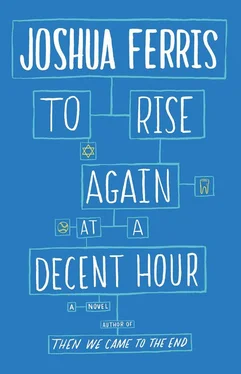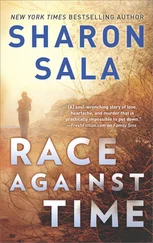“Sounds like he was really in love.”
“He didn’t know himself back then. He didn’t know a thing about his past, his family.”
“Have you ever been in love like that?” I asked him.
“You mean, with someone ill suited for me?”
“Someone you chose unwisely, because you were searching for something more than, you know, just a girlfriend.”
“Have you?”
I told him about Sam and the Santacroces and Connie and the Plotzes.
“They claim it’s a common thing,” he said. “Maybe it is. What the hell do I know? Sure, I was in love like that once.”
He had been new to the city, virtually penniless, without friends, when he found himself one day at a storefront fire temple in Queens.
“A fire temple?”
“It’s Zoroastrian,” he said. “Are you familiar with the Zoroastrians?”
“No more than the rest of us,” I said.
He’d gone there after reading up on the world’s religions and finding that Zoroastrianism held some primal appeal. According to the Zoroastrians, there was light, and there was darkness, and the light and the darkness did battle. At least that was his crude understanding at the time. He hung around the place talking to the head priest, a man named Cyrus Mazda, who tended to a fire they kept burning in a pit. He liked Mazda’s mustache, the two halves of which repelled each other as if by the work of magnets. Before long, Mercer caught sight of a girl who belonged to the congregation, and he fell head over heels. The girl was a second-generation Americanized Iranian who rebelled against her parents in big ways and small. She and Mercer snuck around, made out on the subways. They connived and hatched plans. Then reality set in. Conservative Zoroastrians didn’t go for mixed marriages. Marriage was arranged, new world or not. Mercer’s love was married off by the time he was twenty, and he took his wrecked heart and ruined spirit to the markets. His goal was to return to the fire temple as a millionaire and make a donation, to make them rue what they had spurned. Attrition wasn’t the only Zoroastrian woe: they had no money for outreach, education, expansion out of Queens.
“Did you do it?” I asked.
“Not after a million,” he said. “I was too busy by then, and my heart was healed. Calloused, maybe, poor me. But when I had, oh, a hundred, I bought them a temple in New Jersey. But anonymously.”
“You took your revenge out anonymously?”
“I had nothing to prove by then, and no desire to take credit. And like I said, it wasn’t the girl I fell in love with first. It was the light defeating the darkness. It was the man with the mustache in the white robe and gold sash who kept the fire alive. And Dari,” he said. “I loved to hear Dari spoken.”
He motioned to the bartender. We watched the mute man pull a bottle from the shelf, pour out our little gemstones, and retreat back to his me-machine.
“So I take it you weren’t a Christian,” I said.
“Born and raised,” he said.
At the age of thirteen he had been baptized and confirmed in the name of Jesus Christ and given a Bible with his name on it. There was never an imperative or moral duty to read it, so it was put away and never opened. Jesus Christ was a birthright and a friend. He personally looked out for Mercer. When Mercer was scared, He hovered nearby, protecting him. When Mercer did something bad, He looked down upon him in shame and heartache. When Mercer sought forgiveness, He granted it. To maintain this love, only one thing was required of Mercer: faith. No sacrifice, no ritual, no way of life counted more than that simple statement of his heart’s intent, and upon him was conferred all of God’s grace. It didn’t matter that he didn’t really know his own heart and wouldn’t know it for years. With a declaration of faith came absolution on earth, heaven when he died, and presents on Christmas Day.
“I have some fond memories of church,” he said. “People who were nice to us. And I remember trying to pray after my mother died. I brought my hands together, I bowed my head. But then I thought, Let’s just say it is Jesus Christ up there. He’s not likely to be a fucking idiot, is He? He knows. He knows all right. So do the both of you a favor and get the hell off your knees.”
The door opened, and a loud group entered. They got drinks and retreated to the pool room, and for the rest of our conversation we heard billiard balls clinking in discreet silence, sometimes followed by roars and moans.
“To be honest,” he said, “I’ve tried just about all of them.”
“All what?”
“Religions.”
This included a long time devoted to Zen Buddhism, with annual retreats to Kyoto to study with a master who fought as a foot soldier in World War II. Mercer, who steadily grew his fortune over three decades, yearly submitted himself to a complete divestiture for ten days and did nothing but meditate on tatami mats and beg in the streets for alms. He was seeking, he said, always seeking, seeking so strenuously as to guarantee he’d never find. “Twelve years I went back and forth to Kyoto. It helped me see the bigger picture, but it left me cold in the end. You know what I think of Buddhism? It has good answers to all the wrong questions.”
He looked into Jainism, into anthroposophy, into Krishnamurti. He liked Judaism. He admired the Koran. He chuckled through Dianetics. He had no respect for what he called the Churches of Welcoming All: Unitarian, Baha’i, the rest of humanity’s tender mercies. He required something that looked evil in the eye, that understood the meaning of mercy to be justice commuted by grace, and that contended with the fact that death was nothing he was going to adjust to, make amends with, or overcome.
“I’m exempt from the worst of it,” he said. “I’ll never know suffering. I’ll never again know discomfort, if I so choose. But I die in the end. I still die, and maybe fucking horribly. And who knows what after.”
In the meantime, nothing sufficed, nothing was equal to the question, Why am I here?
“I wish I could have been a Christian,” he said. “I’d have had someone to the left of me and someone to the right always ready with an answer, whatever the problem, amens and potlucks, little talks with Jesus, and peace for life everlasting.”
He gestured to the bartender, who poured him another.
“The most interesting thing I’ve done was a five-day… what was it called,” he asked himself. “It was a deprogramming, but they never used that word.”
“A deprogramming?”
“At a certain point, I just said fuck it, you know? I’m hounded day and night, the seeker has become the sought, I’m wasting my life worrying about this crap. So I wanted to get rid of what I’d always called the Jesus Christ in my head. I mean God, God’s voice, but because I was raised a Christian, it was Jesus. Jesus judging, Jesus protecting, Jesus saying, ‘You might want to rethink that.’ Whatever the case may be. Big or small. Jesus was always there. Making little marks. Tallying it all up. Do you have that voice, always telling you right from wrong?”
“Sure,” I said. “But it’s usually off the mark.”
“Rechanneling, that’s what they called it. It’s like a recovery center. They’re in California. Everything that’s not in Asia is in California. I went out there to ‘rechannel.’ They have people on staff, behavioral therapists, neuroscientists, philosophers, atheists. The idea is to stop thinking that that voice was given to you by God to do His work and to start thinking of it for what it is: old-fashioned conscience. Something naturally acquired. Evolution’s gift. They hook you up to monitors, do brain scans. You role-model God. You study atrocities. They show you time-lapse videos of decaying animals. ‘Codependence to Aliveness’ was their motto.”
Читать дальше












